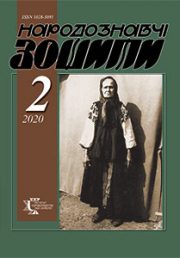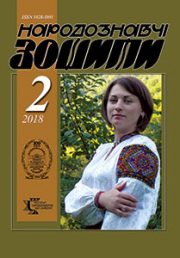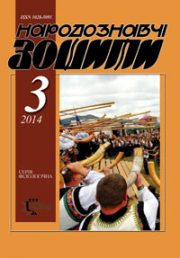The Ethnology Notebooks. 2022. № 1 (163), 183—191
УДК 94-054.7(100)”1944/1945″
DOI https://doi.org/10.15407/nz2022.01.183
NAUMENKO Olena
- ORCID ID: https://orcid.org/0000-0002-8433-4088
- аспірантка, кафедра нової на новітньої історії зарубіжних країн,
- Львівський національний університет імені Івана Франка,
- вул. Університетська 1, 79000, м. Львів, Україна,
- Контакти: e-mail: naumenko95naumenko@icloud.com
Abstract. Problem statement. The problem of displaced persons and refugees is very important in today’s world. First of all, this applies to the countries of the Middle East, which are local centers of hostilities. As of the XXI century, the US government has faced a similar problem, as the uncontrolled flow of refugees from Mexico has caused considerable concern of the White House. It should be noted that in some way this topic also applies to current events related to the situation around Afghanistan, which has become a new source of refugees.
The purpose and objectives of the research are to analyze the evolution of the views of the political circles of the United States and Great Britain on the forced repatriation of Soviet displaced persons, as well as the reaction of the USSR to the actions of former allies.
In historiography, the issue raised in the article has been considered in part by foreign researchers, including Donna Dismuskes [6], who describes British and American military resistance to forced repatriation; Nicholas Bettel [2] and Nicholas Tolstoy [8], which to some extent illustrate the transition from coercion to dialogue with Soviet repatriates from the West.
The source of the study is a collection of documents edited by historians Paul Cole [5], Mary Carroll and Goodrich Leland [4], which reflect changes in the repatriation policy of the Western countries.
Methods. The article is based on the principles of historicism and involves methods of analisis, generalization, synthesis and comparison.
Keywords: displaced persons, forced repatriation, World War II, Western countries, USSR.
Received 12.01.2022
REFERENCES
- Elliott, M.R. (1982). Pawns of Yalta. Illinois: University of Illinois Press. Retrieved from: https://ua1lib.org/book/5544222/f05cb1 (Last accessed: 15.10.2021).
- Tolstoy, N. (1977). The Secret Betrayal. New York: Charles Scribner’s Sons.
- Bailey, R.H. (1981). Prisoners of War. Chicago: Hardcover. Retrieved from: https://www.worldcat.org/title/prisoners-of-war/oclc/7672216 (Last accessed: 22.10.2021).
- Verovsek, P.J. (2016). Screening Migrants in the Early Cold War: The Geopolitics of American Immigration Policy, 20 (4). Sheffield: Journal of Cold War Studies. Retrieved from: https://eprints.whiterose.ac.uk/110058/2/Verovsek%20JCWS%20final%20updated%20manuscript%20%281%29.pdf (Last accessed: 05.10.2021).
- Bethell, N. (1974). The Last Secret: the delivery to Stalin of over two million Russians by Britain and the United States. New York: Basic Books. Retrieved from: https://www.worldcat.org/title/last-secret-the-delivery-to-stalin-of-over-two-million-russians-by-britain-and-the-united-sates/oclc/717462931?loc= (Last accessed: 28.10.2021).
- Cole, P. (1994). POW/MIA Issues: World War II and the Early Cold War (Vol. 2). Santa Monica: National Defense Research Institute. Retrieved from: https://www.rand.org/content/dam/rand/pubs/monograph_reports/2006/MR351.2.pdf (Last accessed: 27.10.2021).
- Carroll, M.J., & Leland, G.M. Documents on American Foreign Relations (1944—1947) (Vol. V). New York: World Peace Foundation.
- Dismukes, D.E.(1996). The Forced Repatriation of Soviet Citizens: A Study in Military Obedience. Monterey: Naval Postgraduate School. Retrieved from: https://core.ac.uk/download/pdf/36701975.pdf (Last accessed: 12.11.2021).
- Buhite, R.D. (1986). Decisions at Yalta: An Appraisal of Summit Diplomacy. Delaware: Rowman&Littlefield Publishers. Retrieved from: https://www.worldcat.org/title/decisions-at-yalta-an-appraisal-of-summit-diplomacy/oclc/470429161?referer=di&ht=edition (Last accessed: 11.10.2021).







